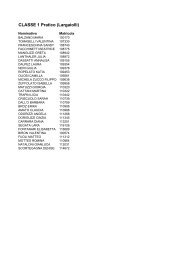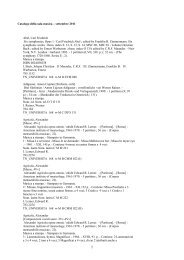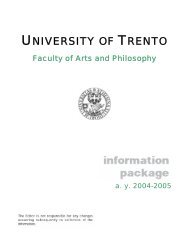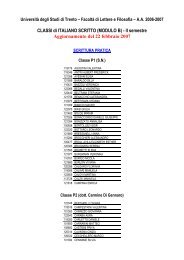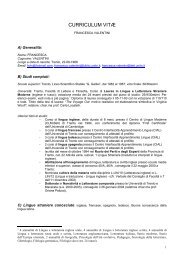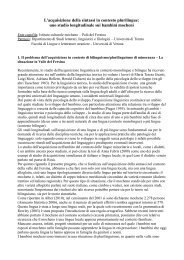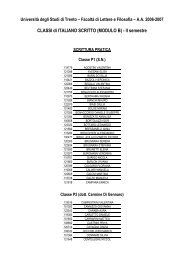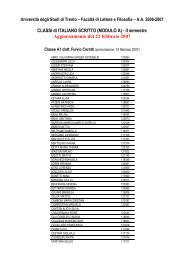PISA Under Examination - Comparative Education Society in ...
PISA Under Examination - Comparative Education Society in ...
PISA Under Examination - Comparative Education Society in ...
Create successful ePaper yourself
Turn your PDF publications into a flip-book with our unique Google optimized e-Paper software.
<strong>PISA</strong> AS A POLITICAL INSTRUMENT<br />
to environmental changes. In the n<strong>in</strong>eties ICT entered as a technology education<br />
and with Internet the asset to <strong>in</strong>formation and knowledge radically changed.<br />
The dom<strong>in</strong>at<strong>in</strong>g themes <strong>in</strong> the public discussion dur<strong>in</strong>g the '90s were the<br />
professional role of the teacher, school management and educational leadership.<br />
This has to be understood as a consequence of the changes sketched above. To<br />
govern by goals requires clear goals. At the same time these goals must give space<br />
for <strong>in</strong>terpretation and implementation. The essence of goals is that they are not<br />
formed as rules. Goals have to be owned by those who have the responsibility to<br />
implement them. Here the essence of goals meets the essence of professionalism <strong>in</strong><br />
the sense of hav<strong>in</strong>g a knowledge base to <strong>in</strong>terpret and make goals concrete <strong>in</strong><br />
relation to teach<strong>in</strong>g and learn<strong>in</strong>g processes. And furthermore, it calls for a clear<br />
division of responsibility and, hence, accountability.<br />
To summarize, the changes <strong>in</strong> production and economy created a pressure on<br />
handl<strong>in</strong>g an expand<strong>in</strong>g welfare society. Movements towards decentralisation and<br />
privatisation can be <strong>in</strong>terpreted as two ways of solv<strong>in</strong>g the problems discussed.<br />
Both these solutions demand changes <strong>in</strong> curricula and <strong>in</strong> evaluations. The<br />
contradiction I have tried to po<strong>in</strong>t at is that the change of the political landscape<br />
and <strong>in</strong> adm<strong>in</strong>istration operated <strong>in</strong> a way that goals became more abstract. The<br />
change towards what can be described as the “third <strong>in</strong>dustrial revolution” called for<br />
new abilities and competencies that re<strong>in</strong>forced the difficulties to articulate goals <strong>in</strong><br />
such <strong>in</strong> a precise way.<br />
This change has changed the conditions for <strong>in</strong>ternational comparisons<br />
by assessments. The German historian Re<strong>in</strong>hard Koselleck uses the concept<br />
“temporalisation” <strong>in</strong> his research on how concepts change mean<strong>in</strong>g over time<br />
(Koselleck 1979, 2003, 2006). International assessment is a concept that has been<br />
temporalised. It has moved from the Cold War context to a world threatened by<br />
environmental change and conflicts between faiths and a global economy.<br />
<strong>PISA</strong> IN CONTEXT<br />
These notes about a emerg<strong>in</strong>g “knowledge society” has the <strong>in</strong>tention to give a<br />
context to the development of the <strong>PISA</strong> programme. In 1968 OECD established a<br />
specific centre for <strong>Education</strong>al Research and Innovation – CERI (Papadopoulos,<br />
2006). It is unnecessary to say that 1968 was a year of specific importance <strong>in</strong> the<br />
history of education. CERI became besides the <strong>Education</strong>al Committee as an<br />
important policy <strong>in</strong>stitute (Waldow, 2006).<br />
Dur<strong>in</strong>g the seventies and the eighties I participated <strong>in</strong> several OECD activities<br />
<strong>in</strong>clud<strong>in</strong>g an evaluation of the school system <strong>in</strong> Norway. In the late eighties I was<br />
<strong>in</strong>volved <strong>in</strong> the “<strong>Education</strong> Indicators Program” (INES). This very ambitious<br />
programme aimed at build<strong>in</strong>g a system for education statistics <strong>in</strong> order to enable<br />
comparisons between countries with<strong>in</strong> the OECD. Such a statistical system had of<br />
course an impact on national policies. In a global world <strong>in</strong>ternational <strong>in</strong>dicators<br />
delivered support for arguments on competitive strength. The active advocate for<br />
an OECD statistic was the United States. The background was of course the<br />
25




